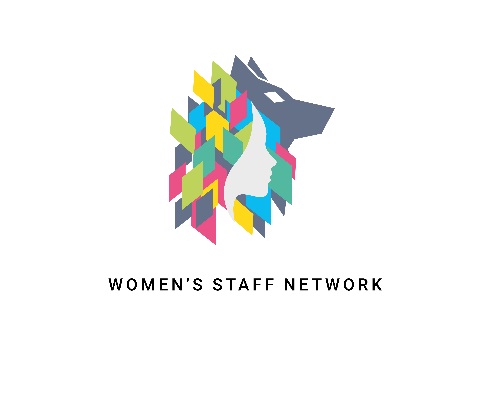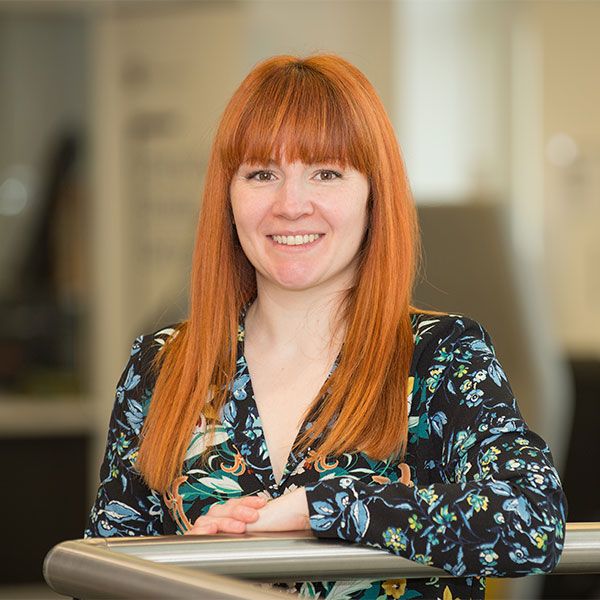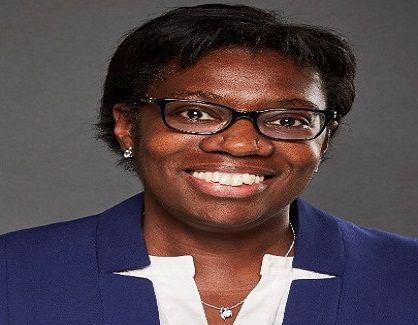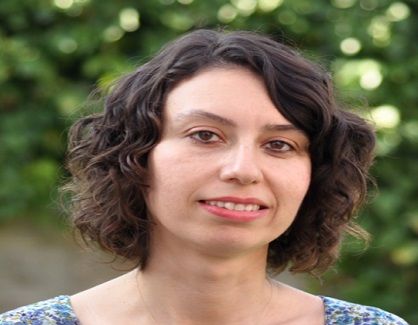
This page will host all of our case studies from The Women's Staff Network.
We call this series 'In The Spotlight'. To be featured, please e-mail us.
As the next edition of the Women’s Staff Network Spotlight series, we are focussing on Professor Laura Caulfield, Founding Chair and Director of the Institute for Community Research and Development.
Laura has been undertaking research with public, private, and third-sector agencies since 2001, and is an expert in bridging the gap between evidence, policy, and practice. She primarily works on the evaluation of programmes
and has received funding from the Home Office, Economic and Social Research Council, the Arts Alliance, the NHS, the Youth Offending Service, the Ministry of Justice, and several third-sector organisations. Laura has significant leadership experience and is an expert in research design, and qualitative and quantitative methods. Her latest book, ‘Criminological Skills and Research for Beginners’ was published in March 2018.
I started my career and academic journey wanting to be a forensic psychologist. I wanted to work within the prison system but was given the opportunity to take a placement year at University of Portsmouth, which was a research role in the International Centre for Forensic Psychology. I got the opportunity to visit prisons and really understand the youth justice system. It was a revelation that research in this area was a career choice and while I wasn’t the most dedicated student, I had a natural affinity for research.
When I graduated, I applied for a Research Assistant role with an eminent Professor in the field and to my surprise, got the job!
From there I moved into a largely back-office, data analyst role working with large-scale quantitative data and measures of impact. After a few years of contract research this led me to lecturing within a university and sharing the knowledge I had been developing.
I then followed the academic management route for a few years– Programme lead, Head of Department, Associate Dean (Research). Then in 2017, I realised that the roles I was undertaking were pulling me away from my first love, research. It was a realisation that you can’t be everything to everyone and it’s good to focus on what you want and find the roles that fit that. At just that time I saw an exciting role advertised at the University of Wolverhampton: The opportunity to establish and lead the ICRD was the perfect opportunity for me.
Research as a career is ever changing – no two days are the same and you can see the real impact your work has on the lives of people in your community. I started within Criminology and Forensic Psychology but my research area has widened to encompass the entire community. The Criminal Justice System may be where some of the individuals I work with are identified and encountered but almost at the end of their journey – the antecedents of engagement with the justice system crosses all areas of society. Individuals are complex and the complexity that exists in all our lives is fascinating to me.
It’s hard to narrow it down to one piece of advice for everyone.
For fellow researchers – don’t try to do it all on your own. Start small and build a community. The cycle of applying for grants and submitting papers can be disheartening at times, especially if you try and go it alone, so find those working in the same field and get involved in their projects and studies. Build up your experience in collaboration and your resilience as well as your success rate will grow. For senior research colleagues, be the mentor and role model you needed when you started out.
For women at the university, go for it! If you see a job you might be interested in, don’t worry whether you feel you have every single skill required – put your hat in the ring and take a chance. Find a mentor who will help and support you to build and develop your skills and who can advise you on the options and routes available to you. Career progression is not just the responsibility of the individual but of the collective – we are all responsible for supporting colleagues achieving their dreams.
And for colleagues across the university, be empowered to focus on what’s important. There is a culture of overwork in academia, one that I fight against in the teams I lead - switch off your emails outside of core hours and when you need a few hours to really focus, put your effort into the areas that you have made a priority. We don’t have to do everything for everyone all of the time. Work out what matters most to you and where you can have most impact, and put your energies, talent and skills there. The world will thank you for it.
I am an employment lawyer, Managing Director UK and Europe and an advocate for improving social mobility.
Employment law was the first area of law that really excited me and I studied it in my second year of university. It has the ability to draw you into so many different companies, scenarios and complex areas of law. UK and EU law dominant the practice of employment law, like no other area of law in my view and it is constantly changing. So never a dull moment. In my director role I get to work with around 15 European jurisdictions, supporting their law offices, supporting partners and lawyers and I get to help plot the strategic direction of our firm. You cannot do that without understanding and learning about different cultures which again brings variety and huge satisfaction.
Finally my journey to law was untypical and unexpected. At so many turns, I could have ended up failing to reach my goals and as a result failing to have a better quality of life. It is important that I do all that I can to ensure the path is easier for others.
As the next edition of the Women’s Staff Network Spotlight series, we are focussing on Dr Burcu Can, Reader in Computational Linguistics, a member and the Deputy Head of the Research Group in Computational Linguistics at Research Institute of Information and Language Processing (RIILP).
Burcu has been in academia for 15 years, with an expertise on various fields under computational linguistics and natural language processing. She received funding from TUBITAK (The Scientific and Technological Research Council of Turkey), received performance award from a project that she was leading, published many conference and journal papers in top conferences and journals in the field of computational linguistics, is an editor in computational linguistics journals, and has been shortlisted in Midlands Women in Tech Awards in 2021.
I chose academia over the corporate world because I wanted to be a part of a dynamic group where I could contribute to the science and technology, transfer my knowledge to the students. My journey in academia began as soon as I graduated from university and attained a research assistant position. I developed a syllable-based speech recognition system for Turkish for my MSc dissertation, which was a novel thing for Turkish at that time. Then I was awarded with a full funding for my PhD to study at the University of York in the UK. This was the milestone of the improvement of my research capabilities where I learned how to do research. As a speaker of a language with a rich morphology, I was fond of my research area (and still I am), which has been also one of my fields of expertise. Although I have been working in a range of Natural Language Processing topics since then, morphology has been my longstanding interest.
My post-doctoral position was also at the University of York as part of the Artificial Intelligence Group. Then I attained lectureship at Hacettepe University and worked as an assistant professor, founded Computational Linguistics Research Lab, which hosted around 15 national and international graduate students. I was also a visiting researcher at the Institute of Statistical Mathematics in Tokyo to collaborate on computational morphology where the focus was also the Japanese and Turkish languages.
I have been working at the University of Wolverhampton for two years now, and I am a member and the research head of the Research Group in Computational Linguistics. I am very happy to be part of this lively and energetic group.
Research is always dynamic, especially in our field which is a subfield under Artificial Intelligence. You never get bored because the methodology, the main trends, the perspective of the field change every single day. You need to keep yourself up to date which pushes your limits and it does not allow you to take it easy. It is also a great feeling to be contributing to the useful scientific developments in the field.
It is exciting to see natural language processing is everywhere now and is being used all around the world, through machine translation algorithms on our browsers, through chatbots that facilitate a quick communication with the customer service of a company, through automatic evaluation of reviews on an e-commercial website, and through even an album that is fully composed by artificial intelligence. This is really fascinating and keeps me ever enthusiastic to chase the recent developments and make my own contributions to it.
Be it in academia or in a different setting, aim to find a passion that will motivate you to be productive and excited about what you are doing. Once you find it, there is no reason not to succeed and make an impact in that field. If you’ve already found your dream, then go for it! If you are doing what you love, then you are lucky. If you are not lucky enough to do what you love, then try to find the sides of it that will best suit your skills and interests. I graduated from Computer Science but it was not my main passion at that time.
Then I discovered artificial intelligence and natural language processing under that field, which motivated me to stay in academia and to further dig in this field. Please remember, passion does not always precede hard work. Sometimes you begin feeling passionate about what you do once you see you are getting better at doing it and start harvesting the fruits of your work.
And of course, work is not everything. I would recommend everybody to have at least one hobby that you enjoy doing outside of work hours. Being versatile not only lets you build new skills, but also opens new communication channels, and refreshes your mind to better focus on your main endeavours.


/prod01/wlvacuk/media/departments/digital-content-and-communications/images-2024/240328-Varsity-Line-Up-Resized.jpg)
/prod01/wlvacuk/media/departments/digital-content-and-communications/images-18-19/220325-Engineers_teach_thumbail.jpg)
/prod01/wlvacuk/media/departments/digital-content-and-communications/images-2024/240423-Additive-Research-Centre-Launched.jpg)
/prod01/wlvacuk/media/departments/digital-content-and-communications/images-2024/240320-Uzbekistan-Resized.jpg)
/prod01/wlvacuk/media/departments/digital-content-and-communications/images-2024/240229-The-Link-Resized.jpg)
/prod01/wlvacuk/media/departments/digital-content-and-communications/images-2024/240416-Abi-Dare-Resized.jpg)


